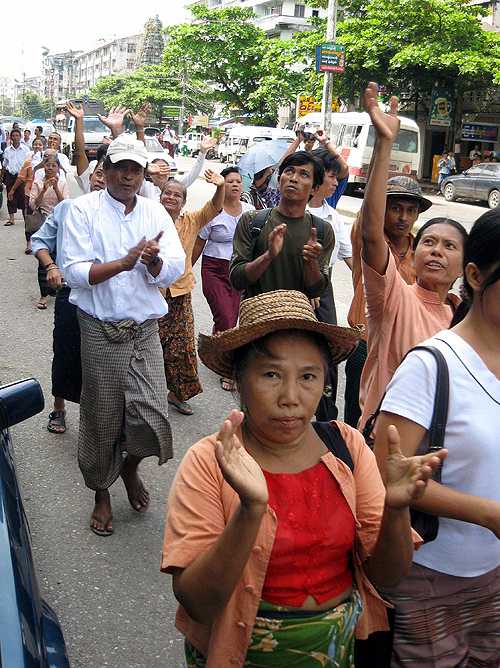Peaceful protests in Myanmar end in military beatings, arrests
Demonstrators march on Insein Road in northern Yangon suburb of Myanmar on Wednesday morning to protest over massive fuel price hikes imposed by the government a week earlier. THE ASSOCIATED PRESS
Aug 24, 2007
Last updated on May 12, 2016 at 02:56 p.m.
YANGON, Myanmar – Myanmar’s military government broke up a peaceful protest march for a second straight day Thursday, beating and arresting participants in an attempt to tame street rallies led by democracy activists against fuel price increases.
Plainclothes officers and some civilian supporters of the junta stopped about 40 people marching quietly two miles toward their party headquarters in the capital.
Authorities ordered bystanders, especially journalists, out of the area after a 30-minute standoff.
Protesters sat on the pavement and formed a human chain, but about a dozen were dragged and shoved into trucks and buses, where some were slapped around, said witnesses, who asked not to be identified for fear of being called in by police.
Get The Daily Illini in your inbox!
Reporters were also roughed up by security personnel, who shouted abusive language.
Myanmar’s ruling junta, which has received widespread international criticism for violating the rights of its citizens, tolerates little public dissent, sometimes sentencing activists to long jail terms for violating broadly defined security laws.
The protest march was the third this week against the government’s doubling of fuel prices last week in the impoverished country.
Government supporters with sticks attacked some of the 300 protesters who marched Wednesday, seizing eight who were accused of being agitators. The eight were interrogated and released. A similar protest was held Sunday.
Most demonstrators Thursday were from the party of opposition leader Aung San Suu Kyi, a Nobel peace laureate who has been under house arrest 11 years.
“Unable to bear the burden of spiraling consumer prices, the public express their sentiments through peaceful means. However, the authorities have arrested, tortured, beaten up and endangered the lives of those who are peacefully expressing their dissatisfaction,” Suu Kyi’s National League for Democracy said in a statement.
The U.S. government called on the ruling military to communicate with various Myanmar factions.
“It’s important for the government there to begin to speak to other groups, to draw on the ethnic minorities, to deal with the other political parties to proceed down a path of democracy and respect of individuals and human rights,” State Department spokesman Gonzalo Gallegos said in Washington.
Economic dissatisfaction sparked the country’s last major upheaval in 1988 – mass demonstrations demanding an end to military rule that began in 1962. The protests were crushed by the army, which held elections in 1990 but refused to honor the results when Suu Kyi’s party won.
The latest protests have been nowhere near the scale of those in 1988, but the junta appeared to be taking no chances.
On Tuesday, authorities arrested 13 leaders of the 88 Generation Students group, which has been staging petition campaigns, prayer vigils and other nonviolent activities to demand the release of political prisoners and call for democracy.
State-controlled media said the 13 could face up to 20 years in prison.
Leaders of 88 Generation Students helped lead the 1988 democracy uprising and were subjected to lengthy prison terms and torture after the rebellion was suppressed.






